Analysis of IT Ethics and Professionalism: Case Study Report
VerifiedAdded on 2022/10/17
|5
|777
|9
Report
AI Summary
This report examines a case study involving Mr. John, an IT professional who violated intellectual property rights and professional conduct by incorporating another company's and a colleague's code into his software without proper authorization. The analysis, based on the ACS Code of Ethics and Chris Macdonald's methodology, identifies violations of public interest, honesty, competence, and professionalism. The report recommends that John should have sought deadline extensions and professional assistance, and emphasizes the importance of ethical practices in maintaining a company's and individual's professional image. It references relevant ACS documents and Australian legislation, concluding with the need for employees to understand the potential legal consequences of ethical breaches.
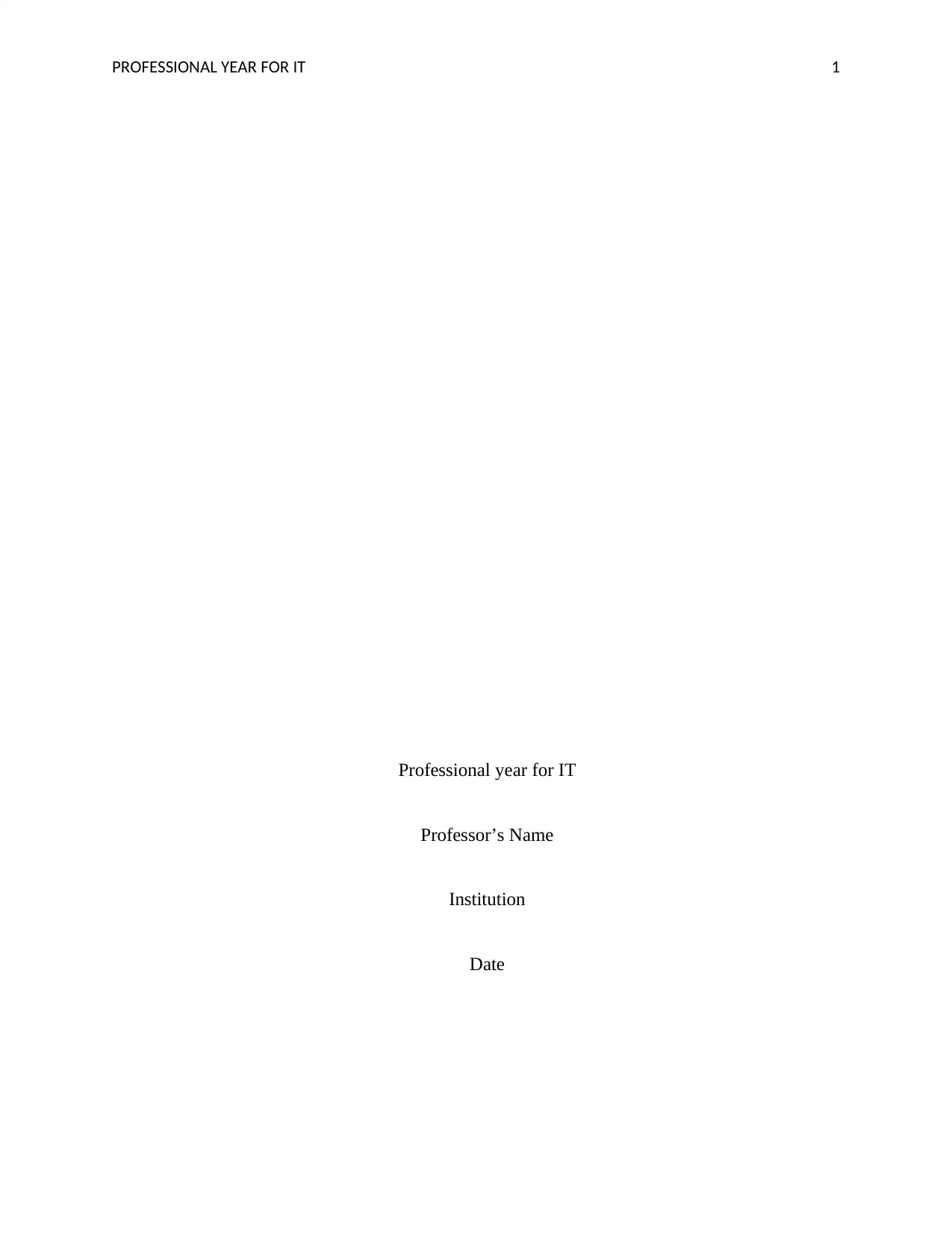
PROFESSIONAL YEAR FOR IT 1
Professional year for IT
Professor’s Name
Institution
Date
Professional year for IT
Professor’s Name
Institution
Date
Paraphrase This Document
Need a fresh take? Get an instant paraphrase of this document with our AI Paraphraser
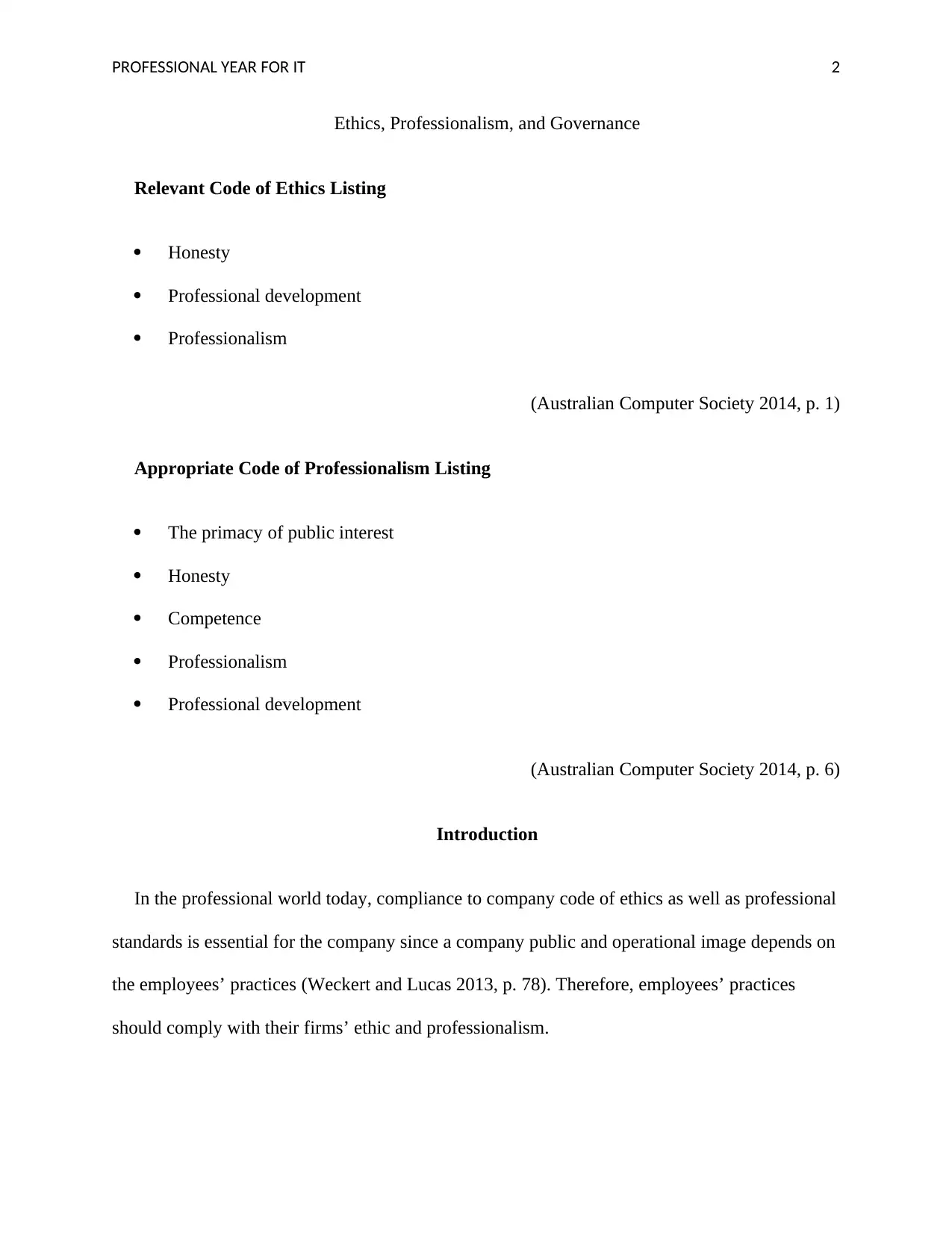
PROFESSIONAL YEAR FOR IT 2
Ethics, Professionalism, and Governance
Relevant Code of Ethics Listing
Honesty
Professional development
Professionalism
(Australian Computer Society 2014, p. 1)
Appropriate Code of Professionalism Listing
The primacy of public interest
Honesty
Competence
Professionalism
Professional development
(Australian Computer Society 2014, p. 6)
Introduction
In the professional world today, compliance to company code of ethics as well as professional
standards is essential for the company since a company public and operational image depends on
the employees’ practices (Weckert and Lucas 2013, p. 78). Therefore, employees’ practices
should comply with their firms’ ethic and professionalism.
Ethics, Professionalism, and Governance
Relevant Code of Ethics Listing
Honesty
Professional development
Professionalism
(Australian Computer Society 2014, p. 1)
Appropriate Code of Professionalism Listing
The primacy of public interest
Honesty
Competence
Professionalism
Professional development
(Australian Computer Society 2014, p. 6)
Introduction
In the professional world today, compliance to company code of ethics as well as professional
standards is essential for the company since a company public and operational image depends on
the employees’ practices (Weckert and Lucas 2013, p. 78). Therefore, employees’ practices
should comply with their firms’ ethic and professionalism.
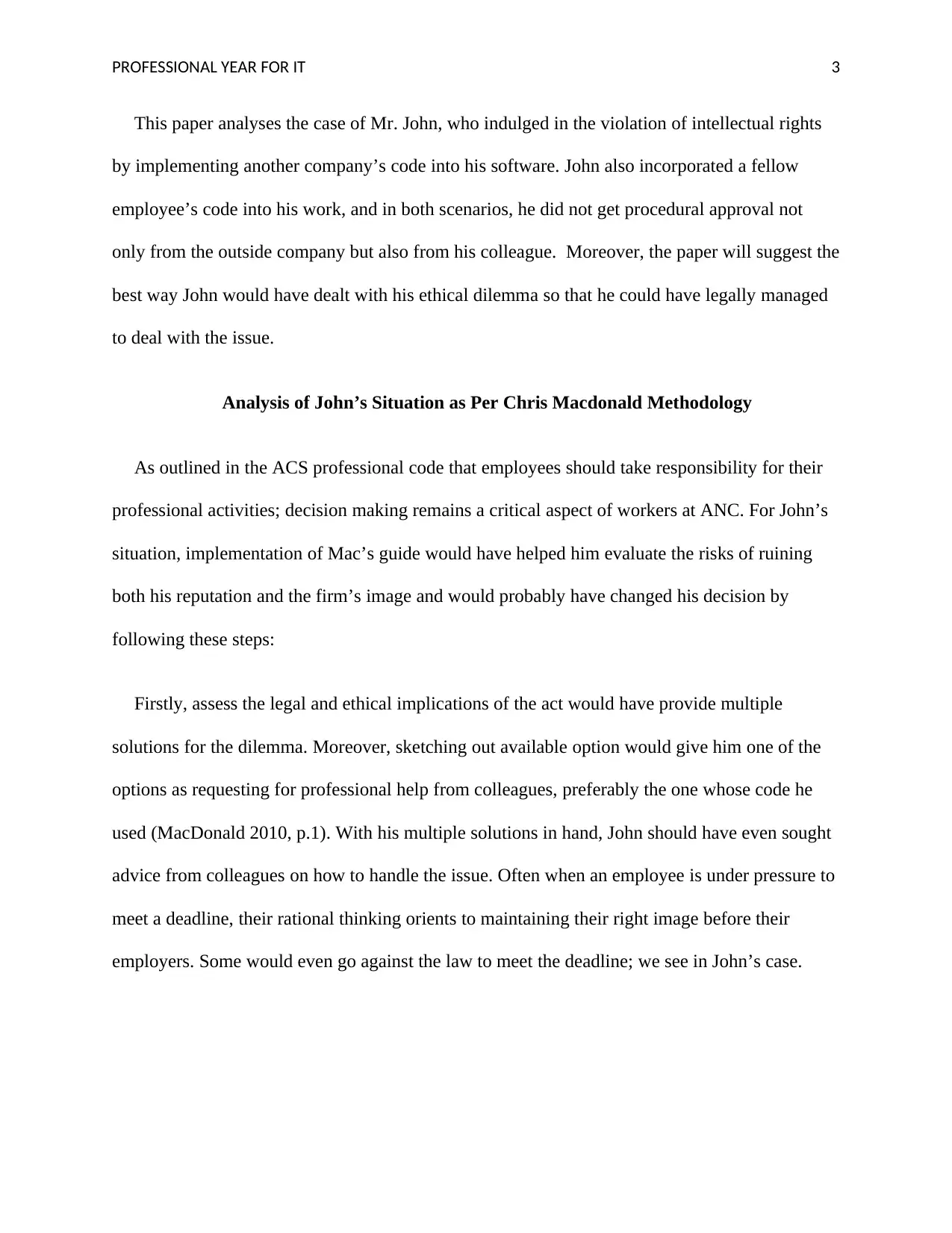
PROFESSIONAL YEAR FOR IT 3
This paper analyses the case of Mr. John, who indulged in the violation of intellectual rights
by implementing another company’s code into his software. John also incorporated a fellow
employee’s code into his work, and in both scenarios, he did not get procedural approval not
only from the outside company but also from his colleague. Moreover, the paper will suggest the
best way John would have dealt with his ethical dilemma so that he could have legally managed
to deal with the issue.
Analysis of John’s Situation as Per Chris Macdonald Methodology
As outlined in the ACS professional code that employees should take responsibility for their
professional activities; decision making remains a critical aspect of workers at ANC. For John’s
situation, implementation of Mac’s guide would have helped him evaluate the risks of ruining
both his reputation and the firm’s image and would probably have changed his decision by
following these steps:
Firstly, assess the legal and ethical implications of the act would have provide multiple
solutions for the dilemma. Moreover, sketching out available option would give him one of the
options as requesting for professional help from colleagues, preferably the one whose code he
used (MacDonald 2010, p.1). With his multiple solutions in hand, John should have even sought
advice from colleagues on how to handle the issue. Often when an employee is under pressure to
meet a deadline, their rational thinking orients to maintaining their right image before their
employers. Some would even go against the law to meet the deadline; we see in John’s case.
This paper analyses the case of Mr. John, who indulged in the violation of intellectual rights
by implementing another company’s code into his software. John also incorporated a fellow
employee’s code into his work, and in both scenarios, he did not get procedural approval not
only from the outside company but also from his colleague. Moreover, the paper will suggest the
best way John would have dealt with his ethical dilemma so that he could have legally managed
to deal with the issue.
Analysis of John’s Situation as Per Chris Macdonald Methodology
As outlined in the ACS professional code that employees should take responsibility for their
professional activities; decision making remains a critical aspect of workers at ANC. For John’s
situation, implementation of Mac’s guide would have helped him evaluate the risks of ruining
both his reputation and the firm’s image and would probably have changed his decision by
following these steps:
Firstly, assess the legal and ethical implications of the act would have provide multiple
solutions for the dilemma. Moreover, sketching out available option would give him one of the
options as requesting for professional help from colleagues, preferably the one whose code he
used (MacDonald 2010, p.1). With his multiple solutions in hand, John should have even sought
advice from colleagues on how to handle the issue. Often when an employee is under pressure to
meet a deadline, their rational thinking orients to maintaining their right image before their
employers. Some would even go against the law to meet the deadline; we see in John’s case.
⊘ This is a preview!⊘
Do you want full access?
Subscribe today to unlock all pages.

Trusted by 1+ million students worldwide
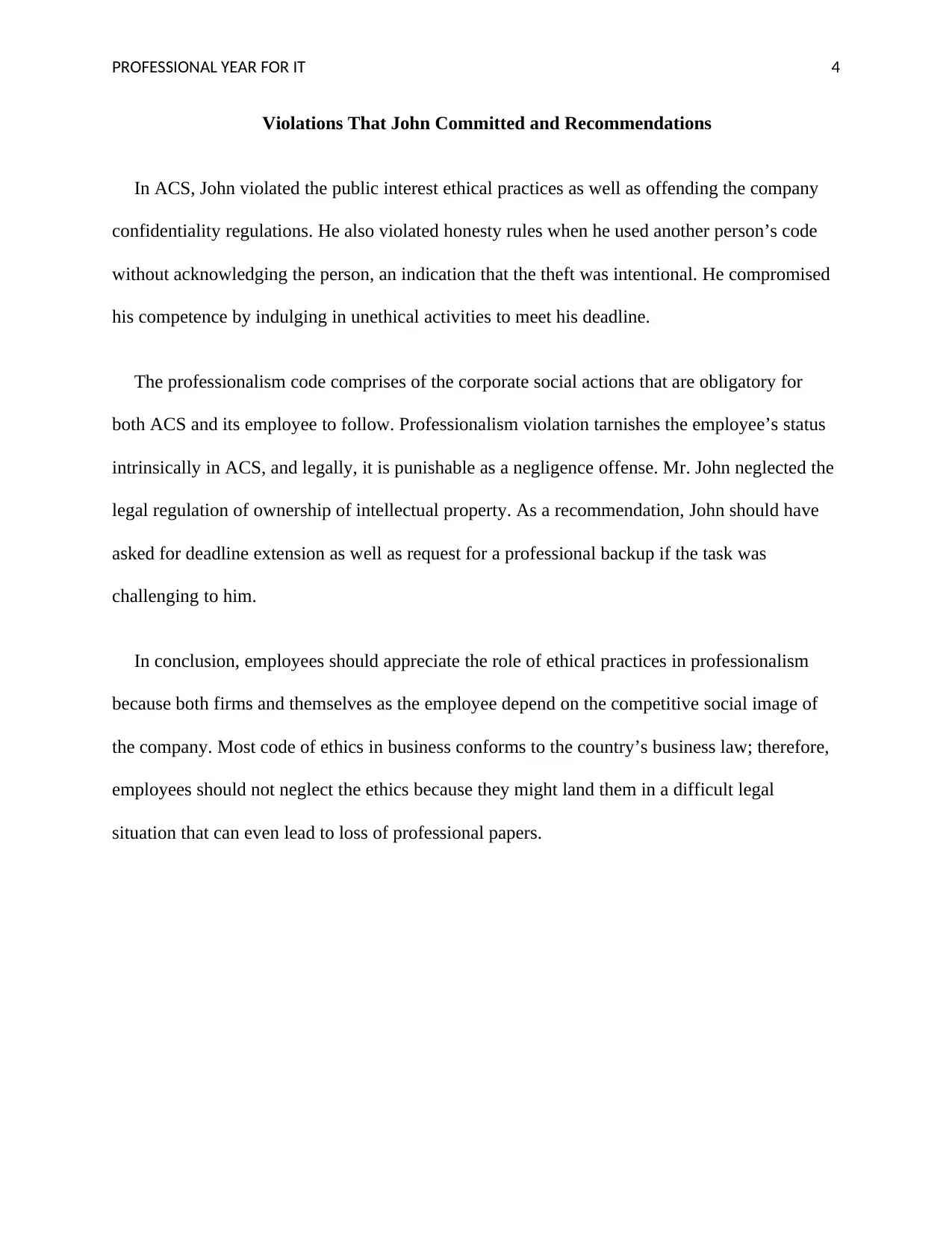
PROFESSIONAL YEAR FOR IT 4
Violations That John Committed and Recommendations
In ACS, John violated the public interest ethical practices as well as offending the company
confidentiality regulations. He also violated honesty rules when he used another person’s code
without acknowledging the person, an indication that the theft was intentional. He compromised
his competence by indulging in unethical activities to meet his deadline.
The professionalism code comprises of the corporate social actions that are obligatory for
both ACS and its employee to follow. Professionalism violation tarnishes the employee’s status
intrinsically in ACS, and legally, it is punishable as a negligence offense. Mr. John neglected the
legal regulation of ownership of intellectual property. As a recommendation, John should have
asked for deadline extension as well as request for a professional backup if the task was
challenging to him.
In conclusion, employees should appreciate the role of ethical practices in professionalism
because both firms and themselves as the employee depend on the competitive social image of
the company. Most code of ethics in business conforms to the country’s business law; therefore,
employees should not neglect the ethics because they might land them in a difficult legal
situation that can even lead to loss of professional papers.
Violations That John Committed and Recommendations
In ACS, John violated the public interest ethical practices as well as offending the company
confidentiality regulations. He also violated honesty rules when he used another person’s code
without acknowledging the person, an indication that the theft was intentional. He compromised
his competence by indulging in unethical activities to meet his deadline.
The professionalism code comprises of the corporate social actions that are obligatory for
both ACS and its employee to follow. Professionalism violation tarnishes the employee’s status
intrinsically in ACS, and legally, it is punishable as a negligence offense. Mr. John neglected the
legal regulation of ownership of intellectual property. As a recommendation, John should have
asked for deadline extension as well as request for a professional backup if the task was
challenging to him.
In conclusion, employees should appreciate the role of ethical practices in professionalism
because both firms and themselves as the employee depend on the competitive social image of
the company. Most code of ethics in business conforms to the country’s business law; therefore,
employees should not neglect the ethics because they might land them in a difficult legal
situation that can even lead to loss of professional papers.
Paraphrase This Document
Need a fresh take? Get an instant paraphrase of this document with our AI Paraphraser
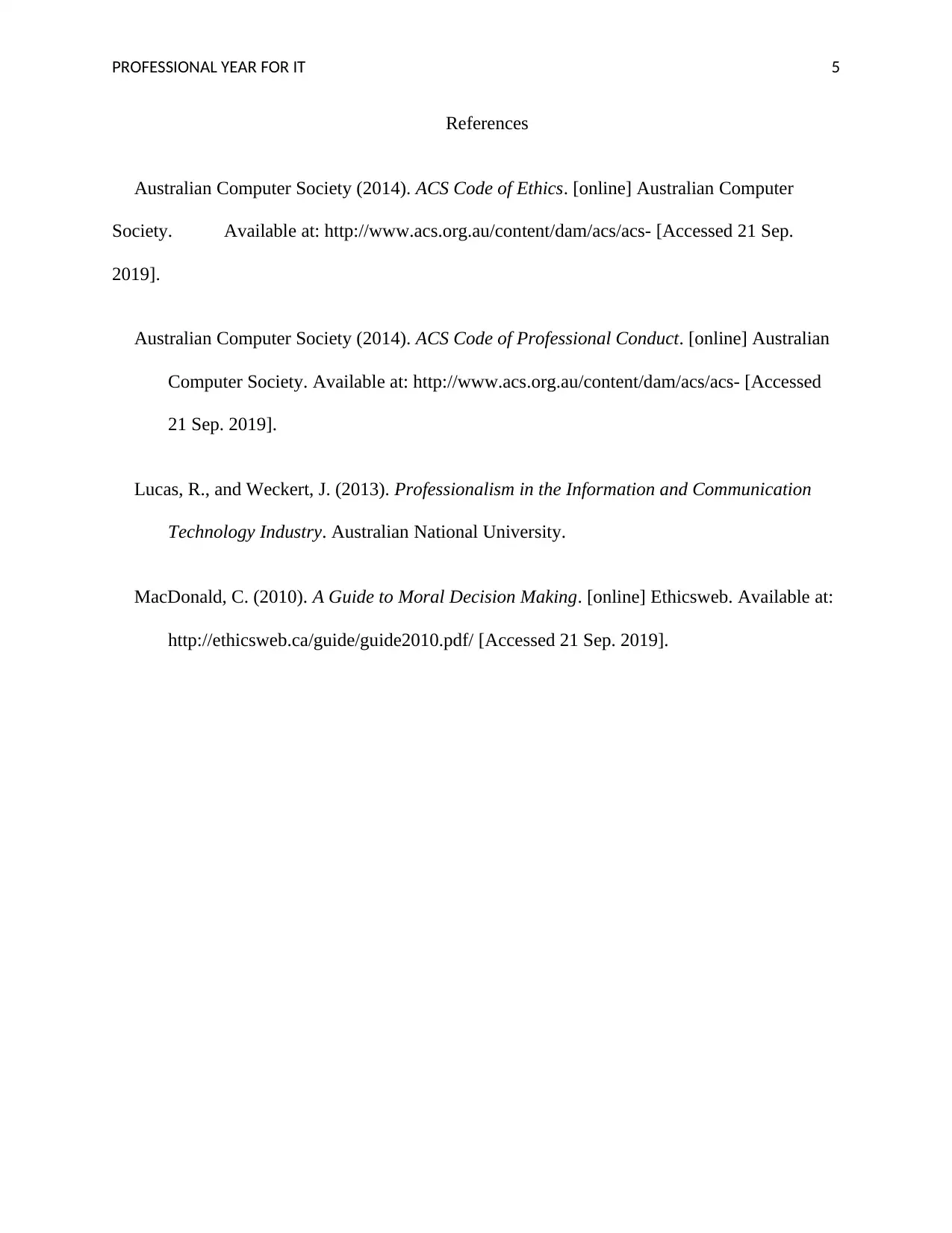
PROFESSIONAL YEAR FOR IT 5
References
Australian Computer Society (2014). ACS Code of Ethics. [online] Australian Computer
Society. Available at: http://www.acs.org.au/content/dam/acs/acs- [Accessed 21 Sep.
2019].
Australian Computer Society (2014). ACS Code of Professional Conduct. [online] Australian
Computer Society. Available at: http://www.acs.org.au/content/dam/acs/acs- [Accessed
21 Sep. 2019].
Lucas, R., and Weckert, J. (2013). Professionalism in the Information and Communication
Technology Industry. Australian National University.
MacDonald, C. (2010). A Guide to Moral Decision Making. [online] Ethicsweb. Available at:
http://ethicsweb.ca/guide/guide2010.pdf/ [Accessed 21 Sep. 2019].
References
Australian Computer Society (2014). ACS Code of Ethics. [online] Australian Computer
Society. Available at: http://www.acs.org.au/content/dam/acs/acs- [Accessed 21 Sep.
2019].
Australian Computer Society (2014). ACS Code of Professional Conduct. [online] Australian
Computer Society. Available at: http://www.acs.org.au/content/dam/acs/acs- [Accessed
21 Sep. 2019].
Lucas, R., and Weckert, J. (2013). Professionalism in the Information and Communication
Technology Industry. Australian National University.
MacDonald, C. (2010). A Guide to Moral Decision Making. [online] Ethicsweb. Available at:
http://ethicsweb.ca/guide/guide2010.pdf/ [Accessed 21 Sep. 2019].
1 out of 5
Related Documents
Your All-in-One AI-Powered Toolkit for Academic Success.
+13062052269
info@desklib.com
Available 24*7 on WhatsApp / Email
![[object Object]](/_next/static/media/star-bottom.7253800d.svg)
Unlock your academic potential
Copyright © 2020–2026 A2Z Services. All Rights Reserved. Developed and managed by ZUCOL.




